
Lancet Regional Health - Southeast Asia
Scope & Guideline
Fostering Collaboration for Healthier Communities
Introduction
Aims and Scopes
- Public Health and Epidemiology:
The journal extensively covers studies related to public health challenges in Southeast Asia, including disease prevalence, health interventions, and epidemiological research, aiming to inform and guide public health policies. - Healthcare Systems and Policy:
The journal focuses on healthcare system evaluations, policy analyses, and health financing mechanisms, with a specific interest in achieving Universal Health Coverage (UHC) and improving healthcare accessibility in the region. - Non-Communicable Diseases (NCDs):
There is a significant emphasis on research related to non-communicable diseases, including cardiovascular diseases, diabetes, and cancer, highlighting their growing burden and exploring preventive and management strategies. - Infectious Diseases and Vaccination:
The journal addresses the challenges and strategies related to infectious diseases, including the impact of vaccination programs, outbreaks, and public health responses, particularly in the context of COVID-19. - Maternal and Child Health:
Research related to maternal and child health is a core focus, covering topics such as maternal nutrition, child development, and healthcare access for vulnerable populations. - Environmental Health:
The journal examines the intersection between environmental factors and health outcomes, particularly the effects of air pollution and climate change on public health in Southeast Asia. - Health Equity and Social Determinants of Health:
There is a strong emphasis on health equity, addressing disparities in health outcomes based on socioeconomic status, geography, and gender, and exploring social determinants that influence health.
Trending and Emerging
- Digital Health and Telemedicine:
There is a growing emphasis on the use of digital health technologies and telemedicine, particularly in response to the COVID-19 pandemic, showcasing innovative solutions for improving healthcare access and delivery. - Impact of Climate Change on Health:
Research exploring the health impacts of climate change is gaining traction, reflecting a recognition of environmental determinants of health and the need for adaptive strategies in public health planning. - Health Systems Resilience and Emergency Preparedness:
The journal is increasingly focused on health systems resilience, particularly in the context of pandemics and other health emergencies, emphasizing the importance of preparedness and response strategies. - Integration of Mental Health into Primary Care:
There is a notable trend towards integrating mental health services into primary healthcare settings, addressing the growing recognition of mental health as a fundamental component of overall health. - Community Health Initiatives and Engagement:
Research highlighting community-based health interventions and the role of community health workers is emerging, reflecting a shift towards grassroots approaches to improve health outcomes. - Antimicrobial Resistance (AMR) Research:
The journal is seeing an increase in studies addressing antimicrobial resistance, emphasizing the need for surveillance, policy interventions, and innovative treatment strategies to combat this global health threat.
Declining or Waning
- Traditional Medicine and Alternative Therapies:
Research focusing on traditional medicine practices and alternative therapies appears to be declining, as the journal increasingly prioritizes evidence-based approaches and modern healthcare solutions. - Epidemiology of Neglected Tropical Diseases (NTDs):
Despite the ongoing challenges posed by NTDs, there seems to be a reduction in dedicated studies on this topic, possibly overshadowed by more pressing public health concerns such as COVID-19 and NCDs. - Pharmaceutical Innovations in Low-Resource Settings:
While still relevant, there is a noticeable decrease in publications related to pharmaceutical innovations tailored for low-resource settings, as attention shifts towards broader health system strengthening and access to existing medications. - Mental Health Interventions:
Although mental health remains a critical area, the volume of studies specifically focusing on intervention strategies appears to have waned, possibly due to the broader integration of mental health into general health discussions.
Similar Journals

Nigerian Journal of Basic and Clinical Sciences
Fostering scholarly communication in basic and clinical sciences.Nigerian Journal of Basic and Clinical Sciences, published by Wolters Kluwer Medknow Publications, serves as a vital platform for disseminating research in the fields of health policy, medicine, and public health, specifically addressing the unique challenges and advancements within these areas in Nigeria and beyond. With an impressive array of contributions, this journal, recognized under the ISSN 0331-8540 and E-ISSN 2320-477X, aims to foster scholarly communication and offer innovative insights particularly pertinent to developing regions. Despite being positioned in the Q4 category for various medical fields in 2023 and receiving low Scopus ranks, the journal stands out as a valuable resource for aspiring researchers, healthcare professionals, and students aiming to explore basic and clinical sciences. While it follows a traditional publication model, it remains an indispensable source for cutting-edge research and case studies that can significantly impact health outcomes. The journal has been consistently publishing since its inception in 2012 and continues to play an important role in advancing the academic discourse within its scope.

International Journal of Child Health and Nutrition
Exploring the vital link between nutrition and childhood health.International Journal of Child Health and Nutrition, published by LIFESCIENCE GLOBAL, serves as an essential platform for the dissemination of research and insights related to pediatric health and nutrition. With a focus on improving the well-being of children and infants, the journal is committed to addressing critical issues that impact child health across diverse populations. Although the journal currently holds a Q4 ranking in both Maternity and Midwifery and Pediatrics, Perinatology and Child Health, it aims to enhance its visibility and impact in the academic community through future contributions. The journal invites researchers, professionals, and students alike to engage with cutting-edge studies and reviews that explore the intersection of nutrition and health outcomes in children. Currently operating as an open-access journal, this publication encourages widespread access and dissemination of knowledge, thus fostering a global dialogue on vital child health issues. Situated in Canada, the journal aspires to uphold the highest standards of research integrity and innovation through its ongoing commitment to child health and nutrition.

Global Health Research and Policy
Innovating solutions for pressing health challenges.Global Health Research and Policy, published by BMC, is a leading open-access journal dedicated to advancing the field of global health through impactful research and policy analysis. Since its establishment in 2016, the journal has garnered a prestigious reputation, achieving a Q1 ranking across several categories including Epidemiology, Health Policy, Health (social science), and Public Health, Environmental and Occupational Health in 2023. With an E-ISSN of 2397-0642, this UK-based journal ensures the dissemination of high-quality research to a global audience, promoting accessibility and collaboration. The open-access model facilitates the sharing of knowledge and innovation essential for addressing pressing health challenges worldwide. Researchers, professionals, and students alike will find valuable insights and relevant policy discussions in each issue, making Global Health Research and Policy a vital resource for those committed to improving health outcomes on a global scale.
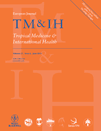
TROPICAL MEDICINE & INTERNATIONAL HEALTH
Uniting voices in the fight against tropical diseases.Tropical Medicine & International Health is a distinguished journal published by Wiley, dedicated to the exploration and dissemination of cutting-edge research in the fields of infectious diseases, parasitology, and public health. With a robust open-access option, the journal facilitates the widespread sharing of information critical to addressing health issues in tropical and international settings. Since its inception in 1996, it has established a significant presence in the academic community, as indicated by its impressive ranking in various Scopus categories, notably positioned in the Q1 quartile for Parasitology and Q2 for both Infectious Diseases and Public Health, reflecting its high influence within these domains. The journal's commitment to advancing knowledge on health challenges prevalent in tropical environments makes it an invaluable resource for researchers, healthcare professionals, and students alike who are dedicated to improving global health outcomes.
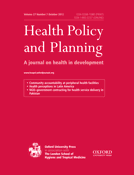
HEALTH POLICY AND PLANNING
Navigating the Future of Global Health Policy.HEALTH POLICY AND PLANNING is a prestigious academic journal published by Oxford University Press that focuses on the critical issues related to health policy and its impact on global health systems. Since its inception in 1986, this journal has rapidly established itself in the field, holding a distinguished position in the Q1 category of Health Policy, with a notable Scopus ranking of #57 out of 310, placing it in the 81st percentile. By providing a platform for empirical research, theoretical analyses, and policy discussions, HEALTH POLICY AND PLANNING aims to contribute to the development and improvement of health policies worldwide. As a valuable resource for researchers, professionals, and students alike, it fosters a deeper understanding of health system challenges and encourages the dissemination of innovative solutions. Although the journal does not offer open access, it remains an essential publication for those engaged in shaping the future of global health policy.
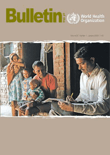
BULLETIN OF THE WORLD HEALTH ORGANIZATION
Connecting Scholars to Global Health SolutionsBULLETIN OF THE WORLD HEALTH ORGANIZATION is a premier scholarly journal published by the World Health Organization, dedicated to advancing research and knowledge in the field of public health. With an ISSN of 0042-9686 and an E-ISSN of 1564-0604, this esteemed journal has been a significant source of information since its inception in 1945, offering insights and updates to researchers, professionals, and students alike. Recognized for its high impact within the field, the journal boasts a Scopus ranking of 31/665 in the categories of Public Health and Environmental and Occupational Health, which places it in the 95th percentile of scholarly publications. Moreover, it has garnered a prestigious Q1 quartile ranking in its category as of 2023, signifying its vital role in disseminating critical research findings and health policies. Located in Geneva, Switzerland, the BULLETIN encompasses a wide array of topics related to global health challenges, aiming to promote evidence-based practices and enhance collaborative efforts worldwide. Researchers seeking to publish groundbreaking studies or stay informed about the latest developments in the field will find this journal indispensable in driving public health advancements.

PEDIATRICS
Exploring innovations for the well-being of children.PEDIATRICS, published by the American Academy of Pediatrics, stands as a leading journal in the field of pediatrics, perinatology, and child health, with a remarkable impact factor reflecting its significant contributions to the healthcare community. Since its inception in 1948, PEDIATRICS has been dedicated to advancing pediatric knowledge and practice, disseminating high-quality research that shapes policies and improves child health outcomes. With an impressive ranking of #5 out of 330 in its category and occupying the 98th percentile, this journal is essential reading for researchers, clinicians, and students alike, fostering a comprehensive understanding of child health challenges and innovations. Although it does not operate under an open-access model, its rigorous peer-review process ensures that each publication meets the highest standards of scientific excellence. For those passionate about improving pediatric care and advancing research, PEDIATRICS remains a cornerstone resource that continues to influence pediatric practice and policy worldwide.
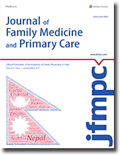
Journal of Family Medicine and Primary Care
Unlocking the Future of Family Medicine TogetherThe Journal of Family Medicine and Primary Care is a premier, peer-reviewed academic journal dedicated to the fields of family medicine and primary healthcare. Published by Wolters Kluwer Medknow Publications, this Open Access journal has been providing a platform for the dissemination of valuable research since 2012, offering researchers, practitioners, and scholars unrestricted access to a wealth of knowledge in primary care practices, policies, and innovations. The journal seeks to bridge the gap between academia and practice by publishing original articles, reviews, and case studies that address contemporary issues in family medicine, thereby enhancing patient care and outcomes. With a commitment to advancing the field, the journal serves as an essential resource for those striving to improve the delivery and effectiveness of healthcare services within families and communities.
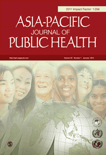
Asia-Pacific Journal of Public Health
Fostering collaboration to enhance community health.Asia-Pacific Journal of Public Health, published by SAGE Publications Inc, is a leading platform for disseminating scholarly research in the field of public health. With an impressive scope that spans from the late 1980s to the present, the journal offers a wealth of articles that address critical issues faced by diverse populations in the Asia-Pacific region. Categorized in the Q3 quartile for both Medicine (miscellaneous) and Public Health, Environmental and Occupational Health, it holds a significant position within its field, ranked 310 out of 665 in the Scopus database. Researchers and professionals have access to valuable insights that inform public health policy and practice, making this journal an essential resource for those aiming to enhance health outcomes in the region. While not currently open access, the journal's rigorous peer-review process ensures the integrity and relevance of its content. As the landscape of public health continues to evolve, the Asia-Pacific Journal of Public Health remains a vital resource for advancing knowledge, fostering collaboration, and promoting a healthier society.
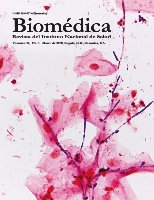
Biomedica
Shaping the future of healthcare with cutting-edge research.Biomedica is a distinguished journal published by the Instituto Nacional de Salud in Colombia, dedicated to advancing knowledge within the fields of biochemistry, genetics, molecular biology, and general medicine. Since its inception in 1981, this Open Access journal has embodied a commitment to disseminating high-quality research, ensuring free and universal access to its published works. With an impressive Scopus Ranking—273rd out of 636 in Medicine and 148th out of 221 in Biochemistry, Genetics and Molecular Biology—Biomedica holds a Q3 category in both disciplines as of 2023, reflecting its growing impact and relevance in the scientific community. The journal welcomes contributions that further our understanding and lead to advancements in healthcare and biological sciences, serving as a critical resource for researchers, professionals, and students alike. The journal operates within a continuous publication model from 2001 to 2024, enriching the academic landscape with contemporary findings and fostering collaboration within the biomedical field.